These days, it seems like the weather has gone crazy. It can feel like it’s hard to predict what kind of weird or wacky weather we might be experiencing this afternoon, much less tomorrow or next week. But while you might have written off the wisdom of your grandparents when you were just a kid, they actually knew a lot more about this stuff than you gave them credit for. They had to tend the farms, and they had to know what was going on. That’s why they created so many of these goofy, folksy sounding weather proverbs.
Related: How to Make a Storm Glass To Predict the Weather
Here’s the thing, though: those weather proverbs are often far truer than you could have imagined when you were a kid. For example, here are 25 proverbs about the weather that you might have once heard from your grandmother, which actually describe conditions far more accurately than one would think. Learn them, study them, and hopefully pass them on to your grandchildren as well.
1. Frogs croaking in the lagoon, means rain will come real soon.
Yeah, it sounds folksy. But actually, this is a very sound piece of advice. Frogs are amphibians — animals that survive in both the land and the water—which requires them to be cold-blooded. They thrive in warm, humid temperatures, since their skin needs the water content in the air. As a result, if you hear a bunch of frogs croaking, then they are signaling that the humidity content in the air is high. They’re not doing this as a signal to you; it’s just them being active. But as it turns out, hot and humid air is a key signal that rain is right around the corner, so always listen for those croaks.
2. When there’s a clear moon, there’s a frost coming soon.
There’s nothing quite so beautiful as a clear night sky, particularly if you live somewhere with no air pollution. However, one should note that if the night sky is so clear that the moon is completely unshrouded and clear as day, it means that the cloud cover has dropped. The clouds tend to keep the heat on the Earth’s surface, so no clouds means falling temperatures. This doesn’t mean that a major frost – or snow — is on the way, but it does signify that you can probably count on waking up to the sight of a little (or a lot) of frost dusting the landscape.
3. When it’s long foretold, long last. Short notice, soon will it pass.
You ever experience a sudden, totally unexpected rainstorm, where buckets of water pour down from the sky, that just blinked into existence out of nowhere? Ever notice how these showers, bad as they might be, never last for too long?
The reason is because gradual changes in the weather, like a slowly darkening day, signify changes that will also last for longer. In the meantime, more rapid and dramatic changes that happen out of nowhere don’t last for long, because they’re moving through quickly.
4. April snow breeds grass.
Cool, wet weather in spring helps grass prepare for strong growth later in the May. It’s just like the saying, April showers bring May flowers but it originated in northern areas with late snows.
5. A coming storm your mouth presage, throbbing aches, and your hollow tooth shall rage.
We’ll be going over this aspect a lot in this list, but basically, when there’s a rainstorm on the horizon, the atmospheric pressure drops sometime beforehand. This can often cause toothaches in people’s cavities, even if you have fillings.
6. Rainbow in the morning, sailor’s warning. Rainbow at night, sailor’s delight.
Rainbows occur on the opposite side of the sky from the sun and in the direction of rainy weather. If a rainbow occurs in the morning, when the sun is rising in the East, that means that the storm is in the West and is likely headed your way. In the evening means that the rainbow is in the east and a storm has likely passed.
7. When the pond and ditch offend the nose, look for stormy blows.
Good air pressure and clean, warm weather keep scents to themselves. Really. That’s why when it rains — or it’s about to rain — it seems to “activate” any of the nasty scents around your house, whether those come from the pond, a ditch… or most likely, your dog’s latest deposit in the backyard.
8. When your pipe smell stronger, it may rain longer.
This is a common variation the previous proverb, relating to the way that strong smells are an indicator of rain—and continuing smells may mean that the rain will last even longer. In this case, the proverb isn’t referring to the pipes of one’s house, but rather, to the sort of pipe that your grandfather probably smoked out of. It isn’t only bad smells that get magnified; even the sweet aroma of the old tobacco can also have a stronger scent right before or during a storm.
9. Doors and drawers get stuck, the clouds may soon be full of muck
Once again, humid air changes the properties of many objects on a chemical level, and wood is no exception. As a result, notice if your door frame, your panty, the drawers of your desk, and so on suddenly start to get stuck. It’s because the wood is expanding, warping due to moisture in the air. This is why a table or desk that’s in a dingy, moist basement for so long can get so bizarrely warped… not to mention why the basement door gets jammed all the time.
10. Mackerel skies and mares’s tails, make tall ships carry low sails
No, we’re not talking about mackerels—or mares, for that matter. Rather, this is a reference to the shapes of clouds. A mackerel cloud, in this context, means an altocumulus cloud, and a “mare” cloud is one that is cirrus. As we know today from meteorology, and as our grandparents knew from this proverb, the shape and consistency of the clouds says a lot about what weather is coming up.
11. When the grass be dry at morning light, expect foul rain before the night.
The morning dew isn’t an indication of rain ahead, but rather, rain that is past. Dew still forms on a clear night, in humid conditions, and when it does, it’s a sign of a clear day ahead. But cloudy nights don’t allow the ground to cool enough, which means there’s no dew. Naturally, cloudy skies mean storms ahead.
12. When dew is on the grass, rain will never come to pass.
Though the reasoning is a bit complex, when due forms on grass it’s an indication of a high pressure system. High barometric pressure means clear weather.
13 . When clouds appear like rocks and towers, the world’s refreshed with frequent showers.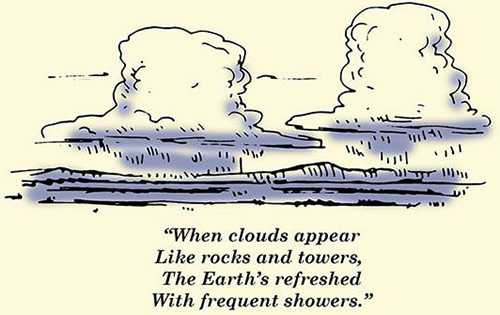
Once again, as we know today, the shapes of the clouds say a lot about atmospheric conditions. Storm clouds often have a distinctive appearance that resembles stacks of boulders, like towers.
14. “When the wind is in the east, It’s good for neither man nor beast.
When the wind is in the north, the old folk should not venture forth.
When the wind is in the south, it blows bait in the fishes’ mouth.
When the wind is in the west, it is of all the winds the best.”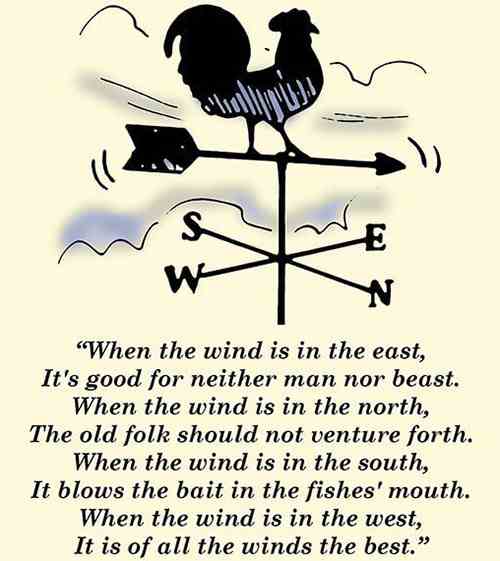
What direction is the wind going? It says a lot, and this proverb demonstrates an understanding of that. A wind coming from the east is a sign of low pressure, and rainy weather ahead. Meanwhile a wind from the north… well, we all know that one. A wind coming from the south, meanwhile, is humid. The best temperatures, as the proverb says, come from westerly winds that blow from our neighbors in California.
15. When smoke descends, good weather ends.
There’s nothing worse than filling up a chimney with wood, setting it ablaze, and then finding out the fire won’t go up, but instead spirals down and outwards. This is due to erratic, dropping barometric pressures that happen before a storm.
16. If the clouds move against the wind, rain will follow.
Clouds moving against the wind means that the wind is moving in a different direction at high altitude. This causes turbulence which leads to stormy weather.
17. The moon, her face be red, of water she speaks.
We’re not talking about eclipses. When a poor weather front is approaching, the low pressure front can be composed of atmospheric dust. This can make the moon appear to be a reddish hue, particularly noticeable on days where there is a full (or nearly full) moon, and it’s a clear sign of what to come.
18. If the new moon holds the old moon in her lap, it means fair weather.
When the moon is framed in its famous crescent shape, the shadowed part of it is usually totally invisible. But not always. When the air pressure is high, making dark conditions more visible to us, you can actually see the outline of the dark part of the moon, sitting in the “lap” of the light part.
19. A ring around the sun or moon means rain will come real soon.
No, this isn’t a trick phrase. Have you ever looked up at the moon, or at the sun, and noticed that there’s kind of a ring around it? This indicates both warmth and moistness in the air, the combination of which is known to produce rain. If you want to predict rainstorms, look out for the halo.
20. When the ass begins to bray, surely rain will come that day.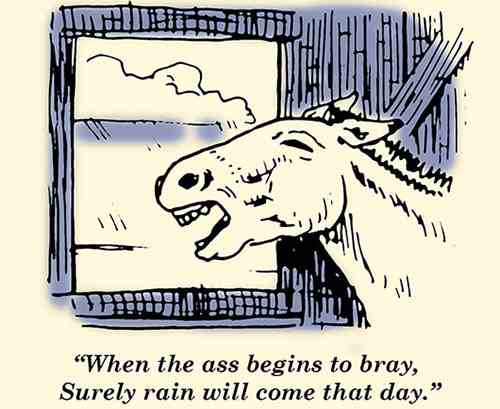
No, donkeys aren’t amphibians, but the logic here is actually pretty similar to the reason that croaking frogs signify poor weather ahead. You know how sometimes your bones ache when there’s rain ahead? That’s a sign of the air pressure plummeting, which it always does before a coming rainstorm. This low pressure is also likely to make people more easily annoyed, and it causes dogs to act up. So if you’re hearing the donkey being particularly loud and obnoxious one day, it’s a good sign about what’s probably up ahead.
21. The sharper the blast, the sooner it will pass.
Torrential, terrible weather might be difficult to deal with, but in the long run, it’s better, because it ends quickly. A slow, steady onset of a little rain, however? That can last a lot longer, even days.
22. Rain before seven? Clear by eleven.
What is actually being referred to in this phrase is not so much rain as it is fog. On clear nights, fog appears due a process called heat conduction, and it pretty much only happens at night or in the early morning—it doesn’t last through the day. If the fog so happens to get thicker, it can produce rain of sorts, though not usually. But because this isn’t a “real” rain, it doesn’t last very long. So what this phrase is getting at is that if you experience a “fog-rain” early in the morning, don’t get worried, because it will be over soon.
23. The ash before the oak, choke, choke, choke. The oak before the ash,
splash, splash, splash.
This refers to which tree breaks bud first in the spring. If ash trees break bud before oak trees, you’re in for a wet summer.
24. If the spiders be many and spinning their webs, their spell will soon dry.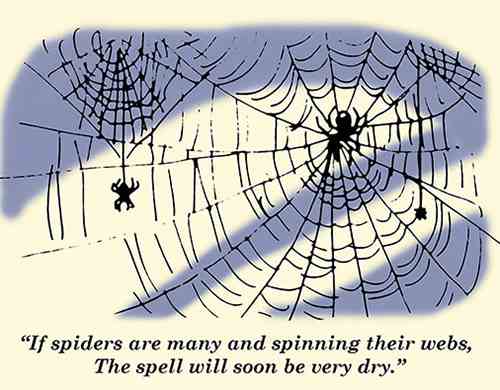
Spider webs are one of the most fascinating structures created by any animal on the planet, but they’re hugely impacted by the level of given moisture in the air. That’s why they like dark corners of the ceiling, or hide behind things, you know. Too much humidity weighs down a spider web, causing it to snap or fall out of place. As a result, moist or rainy weather keeps spiders in their little corners, but if it’s going to get dry, they start expanding their territory so they can catch more flies, mosquitoes, and so forth.
25. When the glass falls low, prepare for a blow. When the glass is high, let your kites fly.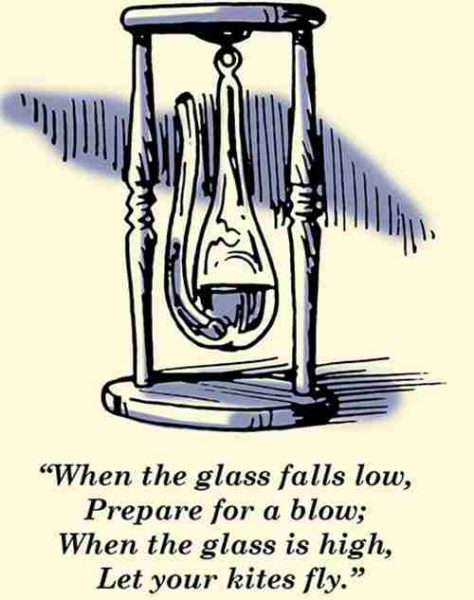
This proverb directly refers to the mercury “glass” or barometer that actually measures barometric pressure. Barometric pressure can be measured with pretty rudimentary tools, so actual measurements have been around since long before computers and weather modeling.
26. Three days rain will empty any sky.
Okay, so this one isn’t always true. But consider, if you live in North America, how rarely it rains for more than three days straight, nonstop. This proverb is specifically referring to weather conditions in this region of the world.
27. Flowers smell best just before the rain.
While this might sound like polite poetry, it’s actually a reasonable predictor of rain. Our sense of smell works better when the humidity in the air is higher, and as humidity increases so does the likelihood of rain.
If those flowers smell particularly good today, savor every moment because they might be washed out by a thunder storm this afternoon.
28. If the geese honk high, it means fair weather. If the geese honk low, foul weather.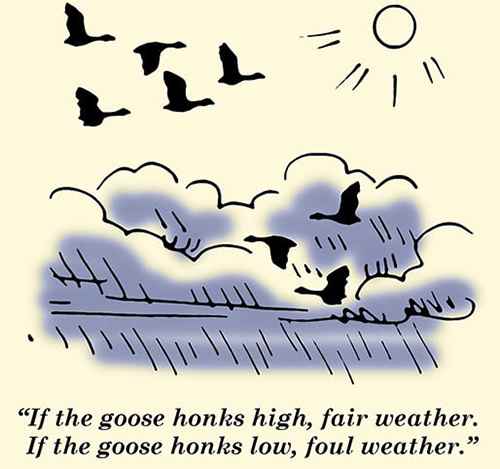
No, geese don’t change their distinctive honk based on weather conditions—they always make the same sound. However, what does change is the distance they’re honking from, which can make them sound different to us. Geese get a lot of practice migrating each year, and they know how to minimize drag by flying in formation and flying at the right altitude. This proverb is based on barometric pressure. If a goose is flying low, it’s due to low barometric pressure, which means that the weather is likely to be rainy soon.
29. If a woolly fleece bestows itself upon the heavenly way, be sure no rain will come today.
This one sounds confusing, but is a bit easier to understand when one realizes that the proverb is not referring to an actual wooly fleece, but rather, a “wooly fleece” of clouds in the sky. Today, these wooly fleeces are more commonly known as scattered cumulus clouds, and yes, they mean you’re in for a nice, clear day ahead.
30. A red sky at night, sailors delight. Red sky in the morning? Sailor’s warning.
Watch out for those red skies, and pay attention to them if you’re out on the water. Sunrises and sunsets indicate dry weather, but the time you see one says a lot about future weather conditions. Sailors know that when there is a bright red sunset, it’s a good sign that there’s good, dry weather ahead for the next day. On the other hand, those ruby sunrises, while beautiful, mean that the dry air has already gone by, and the storm now has open gates to climb into.
31. If salt is sticky, and gains weight, it will rain, before too late.
Ever notice that your salt is clumping together? Often, that’s a good indication of coming rain. This is because salt sucks in moisture from the air, and when the humidity level rises, it’s so much moisture that the salt clumps. So if no salt is coming out of your shaker, get out the umbrella. And keep that umbrella handy, because if these proverbs are any indication, rain is coming sooner or later.
32. When your joints start to ache, rainy weather is at stake.
Joints and old injuries tend to ache when rainy weather is coming. The real reason isn’t fully understood, but the theory is that with less pressure on your body as barometric pressure drops, it allows for swelling in injured joints.
You may also like:
 The Lost Art of Reading Nature’s Signs
The Lost Art of Reading Nature’s Signs
DIY Back-Up Generator (Video)

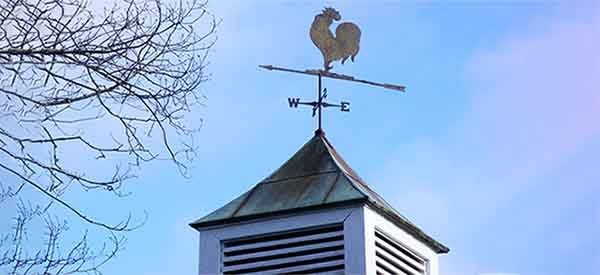













Cool article and pictures with good, sound advice. Thanks for writing it, nice job!
i always heard it as “red sky at night; sailor’s delight. red sky at morn; sailor’s be warn (ed).”
and my old bones sure do ache when the pressure drops. i know that it will rain/snow in the next three days, tops.
I like the one my grandpa used to say: when the golden rods begin to bloom there will be a frost in about six weeks. I missed my prediction by 6 days this year!
hi im ur mom
The one about the leaves budding was confused
You got the “rainbows” comment completely wrong. Substitute “red skies” and you will be in line with the Bible AND the ancient wisdom.
From my child hood,
Never heard of the ring around the sun, but around the moon i was raised calling it a “fairy ring” and to look for it in the winter. It meant either a heavy frost or snow was coming.
If the wind blows and the leaves show their belly, underside, to the sky rain is coming. Same with cattle lying down in the field and especially under trees.
As a side note many times, especially in the winter cattle will stand in a north/ south orientation. The reason is the sun will cover more of their body to provide more warmth.
Being and Old sailor I can attest to the fact ” red sky at night, sailors delight. Red sky in mornin’ sailor take warnin;”
As for the rest of this. HUH? Did you just make it up to fill the article?
nice job